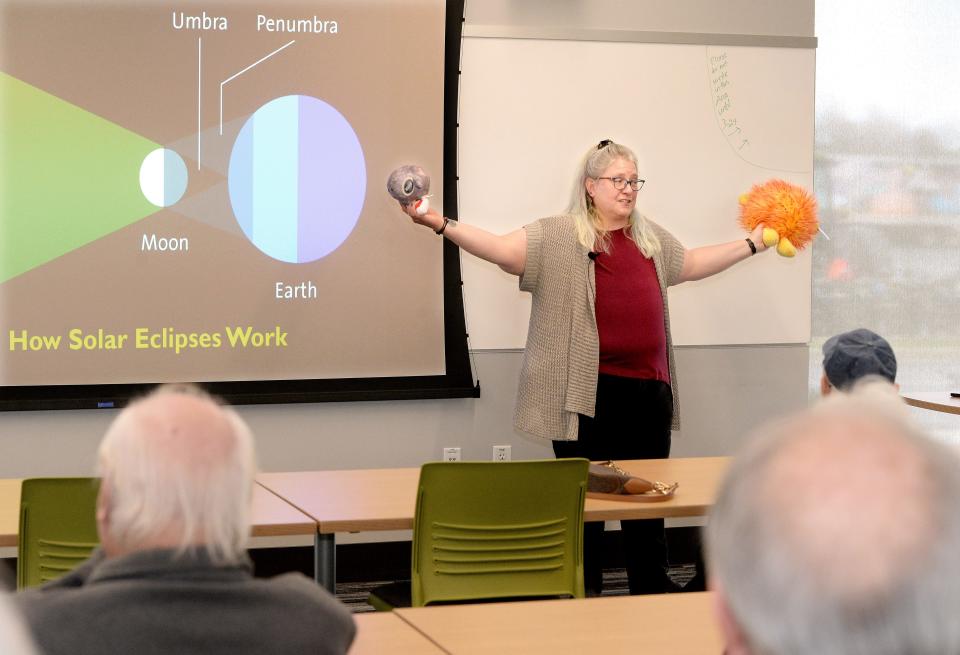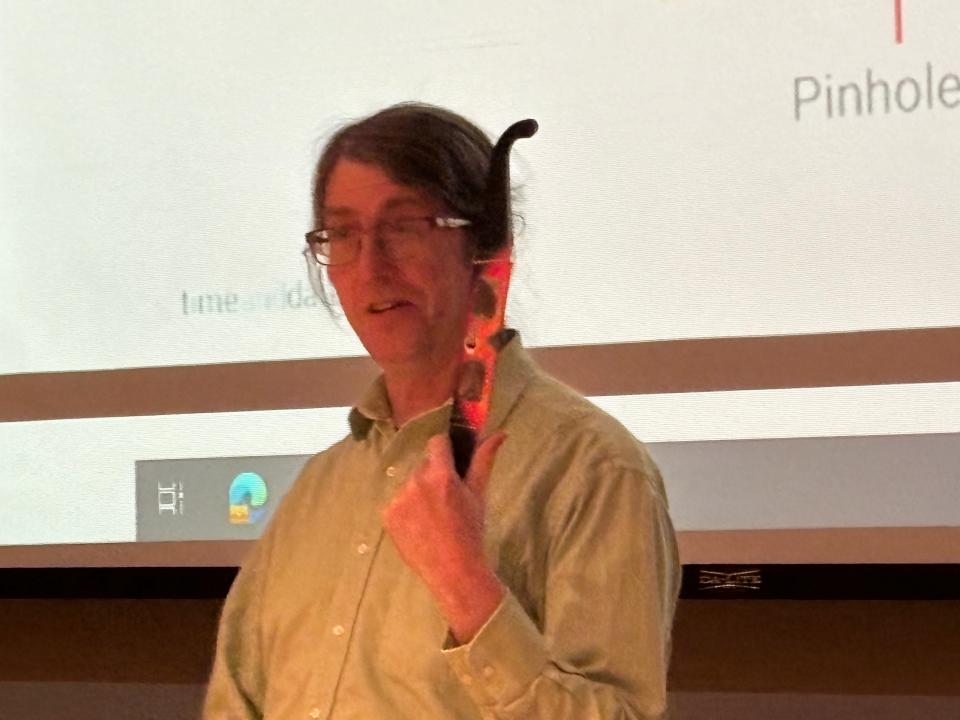Eclipsing expectations: Why experts say this celestial event might make you gasp
Samantha Reif was in southern Illinois for the 2017 total solar eclipse.
When it was over, people in her group applauded and called for an encore.
On April 8, Reif, a geology professor at Lincoln Land Community College, and others will be getting their wish.
More news: Have a few million dollars lying around? You could own Springfield's tallest building

Reif, who is planning a return trip to DuQuoin, said the event can't be oversold.
"It is absolutely humbling," Reif said. "I'm a geologist. We study big things, and we think we understand it all and then you have this moment where you can see the movement of the heavens, literally."
The eclipse’s path of totality stretches from Texas up to Maine, making the bottom third of Illinois—including Carbondale, which drew 200,000 visitors for the celestial event in 2017—again one of the prime viewing spots.
That doesn't mean the Springfield area, which will have 97% totality, isn't getting in on the fun with eclipse watch parties and other promotions.
Reif said going to a place that offers totality is like seeing your favorite band live or a play in the theatre.
"Yes, this is something you can watch (on a recording later)," she said. "But you can't feel the temperature change and you can't notice the birds going to roost. There are sensory feelings you can't get from a video.
More: An extraordinary experience: A total solar eclipse
"As soon as it went to totality (last time), you could hear people gasping."
John Martin, an associate professor of astronomy/physics at the University of Illinois Springfield, acknowledged that in all his years of teaching astronomy, nothing adequately prepared him for seeing the event live in 2017.
"It's a full 360-degree immersion experience because everything gets dark and you get to see the whole sky, not just the moon and the sun," said Martin, noting that planets like Venus and Jupiter should be visible. "It has this effect on people. I really think it's one these experiences that has to be done in person and it would be great if everybody could get the chance to do it at least once."
According to NASA, Illinois viewers won't get to experience a total solar eclipse until 2099.
Here's a primer to April 8.
What exactly are we seeing?
A solar eclipse occurs, Reif explained, when the moon crosses between the sun and the Earth, blocking the yellow surface of the sun from view. During a total eclipse, that surface is 100% blocked, so it's nighttime in the middle of the day. The yellow surface of the sun is never fully be covered during a partial eclipse, which is what Springfield will experience.
The added parts of seeing the total eclipse, Martin said: you'll get to see planets like Venus and Jupiter, given the right sky conditions, and perhaps a comet. You will also be able to see the sun's corona, or its outermost layer, he added.
What time should you be watching on April 8?
In Carbondale, totality begins at 1:59 p.m., the moment the edge of the moon covers all of the sun, which is called "second contact." It will last four minutes and nine seconds.
The deepest point of the eclipse, when the sun is most hidden, in Springfield will be at 2:02 p.m.
Don't forget your glasses
There is, Martin said, "a night and day difference" between totality and a partial eclipse.
"If there's any part of the sun uncovered by the moon, it's not safe to look at with your eyes," he said.
That's why viewers need special protective eyewear, or eclipse glasses. Only when the moon completely covers up the sun can viewers slip off their eclipse glasses, he said.
More: Solar eclipse: Where can I find safe glasses in Springfield? We have you covered
How Springfield is getting in on the act
The Springfield Convention and Visitors Bureau is marketing the city as an "Eclipse Oasis," welcoming visitors to or from eclipse destination sites.
The Crowne Plaza Hotel, 3000 S. Dirksen Parkway, is offering guests access to its rooftop to view the partial eclipse.
SpringHill Suites, 3921 S. MacArthur Blvd., is offering an eclipse-themed dinner for two with craft beers and dessert, while the Abraham Lincoln Hotel, 701 E. Adams St., is preparing picnic baskets for guests.
Eclipse watch parties

Both Lincoln Land and UIS will be hosting eclipse watch parties on April 8.
At Lincoln Land's student union in the lower level of Menard Hall (at the end of Richard Poorman Drive), the party, with trivia, snacks, music and other activities begins at 12:30 p.m.
Reif will be livestreaming from southern Illinois on LLCC's Facebook page at various times during the watch party and during the eclipse itself. There will be a limited number of eclipse glasses available.
The watch party at UIS takes place in the student union (1 William Maxwell Drive) on the north patio beginning at 1 p.m.
The UIS Astronomy Interest Group will have a solar telescope set up that will provide views of the sun in the partial stages before and after the eclipse. Participants can construct pinhole cameras for viewing. Free eclipse glasses will be distributed while they last.
There will be a viewing party at Skyview Drive-In Theatre, 1500 N. Route 66 in Litchfield, at 11 a.m. sponsored by cheapafvideos.
Tickets are $50. The all-day event features live comedy, live music, vendors, a photo booth, a PS5 giveaway and movies.
Contact Steven Spearie: 217-622-1788; sspearie@sj-r.com; X, twitter.com/@StevenSpearie.
This article originally appeared on State Journal-Register: Southern Illinois viewers have a prime spot for the April solar eclipse

